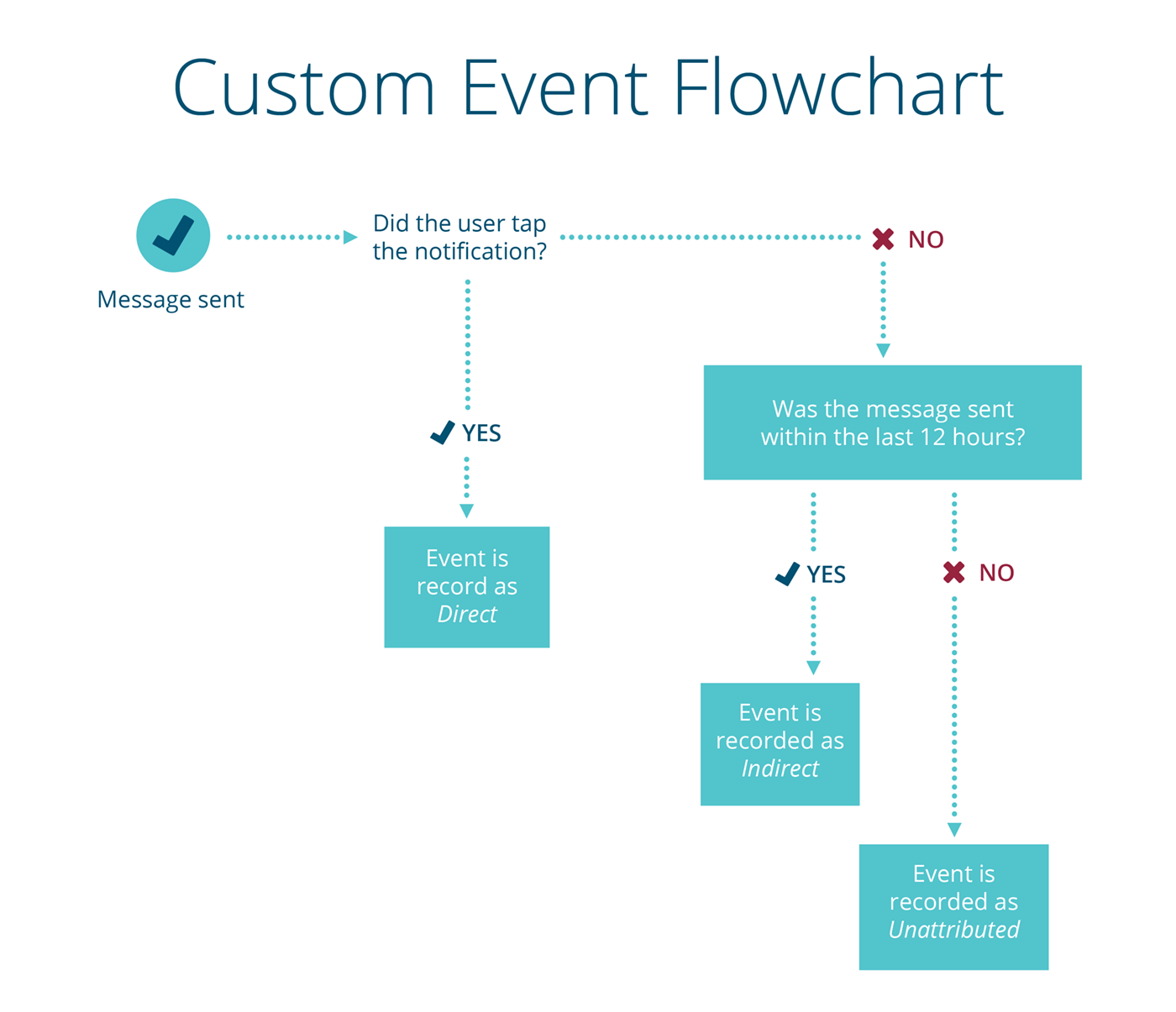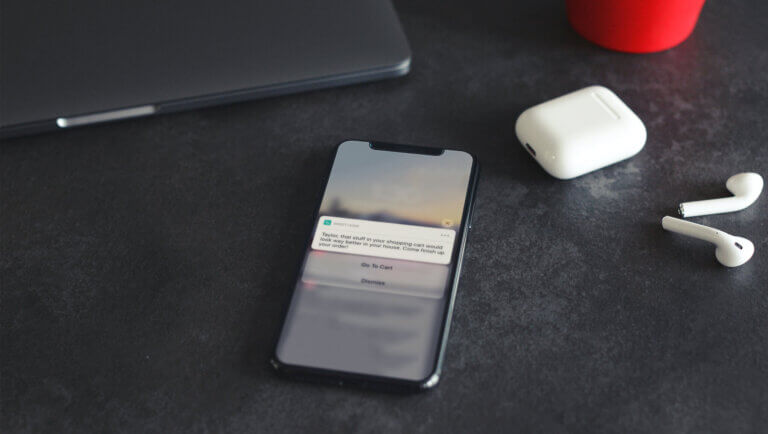
How to Use Custom Events for More Effective Mobile Messaging: FAQs
Mobile interactions allow you to learn a massive amount of information about individual user preferences and interests.
The more you learn about your customers and their actions in your app, the more you can personalize your mobile messaging in real time — and measure the impact of your push notifications, in-app messages and other notifications on your key business goals. (For example, demonstrating that a particular notification yielded X in revenue — or that your mobile users took a particular action in response to a notification.)
The more you can personalize and fine tune your messages the better they'll perform. And when you automate truly effective, personalized mobile messaging, the opportunity is huge.
That’s where custom events can make a big difference.
In today’s post we’re going to tackle some frequently asked questions about personalizing your mobile messaging using custom events. We hope this information will help you get moving in the right direction — or spark new ideas for taking the custom events you already have set up to a new level. We're also happy to chat about the goals you're trying to meet, and whether custom events are the way to get there. Contact us anytime!
Custom Event Basics
What are mobile app “events” and what are they used for?
The term “events” refers to specific actions a user takes in your app, which you can capture with mobile analytics tracking.
Events consist of two very basic pieces of information. They tell you that a) something happened, b) at a particular time.
Custom events in Urban Airship’s mobile messaging solution, Engage, allow you to track, measure and message on just about any type of interaction a user has with your app.
These user actions can have counts or values associated with them, letting you:
-
Track key conversions in your app;
-
Tie those conversions back to corresponding mobile engagement campaigns; and
- Better target users based on what they do.
What goals will custom events help me achieve?
Custom events allow you to respond to how often or how much a user does something in your app — and trigger an automated (or standard) notification, in real time.
You can quantify the value your mobile messaging generates — and you can export custom events to your database of record to have a broader view of a specific app user’s behavior.
For example, you can:
-
Send a push notification or in-app message based on users adding an object to a shopping cart then navigating away from the cart;
-
Automatically prompt users via an in-app message to respond to a survey based on their interaction with a new live video feed that was just released;
-
Automatically schedule a follow up push notification to congratulate users after they start a training session.
How are tags different from custom events?
Tags are static labels for users that tell you something about that user — as a result of them either interacting with your messaging, or from their device properties.
Tags are an excellent way to segment your audience for personalized mobile messaging. But they lack deeper measuring capabilities that help you understand not only if someone did something, but how often — and what might have preceded that interaction.
Custom events allow you to measure or automatically target devices for additional content.
How do custom events work with real time marketing automation?
Custom events can trigger the deployment of real-time automated mobile messaging.
You can add filters within Engage's Composer to trigger custom events when the value of an event is equal to, greater than, or less than a specified value.
For example, this is useful if you want to reward a user who has taken a certain action — like watched videos more than 5 times, or spent over $100 on purchases made through your app.
Whether you're just getting started segmenting your audience and personalizing your mobile messaging, or you've already got a sophisticated setup, we can help. Our Engage solution is trusted by startups and enterprise brands alike to deliver push notifications, in-app messaging and message center messages fast and reliably. Get the scoop, and try it out today for free.
When I want to personalize or segment my mobile messaging, how do I know when I would leverage tags versus custom events?
Tags capture what a user is; a Red Sox fan, a subscriber. These are attributes that are often static.
Custom events are dynamic and capture what a user does, plus how often or how much they do something. To measure the value or number of times a user takes a specific action in your app, you would use a custom event.
-
You can use tags on their own to segment your audience by who they are.
-
You can use events on their own to segment your audience by what they do.
-
You can use custom events on their own to segment what they do by a value you assign.
-
You can also combine all of these options for even more powerful personalization.
What should I do if I just have tags set up? Do I now have to move to using custom events to segment my audience?
If you just have tags in your app, that’s a great start. You do not have to move everything over to custom events.
However, if you want to start tracking custom events, you can do so in one of several ways:
1) You can start integrating custom events into the next version of your mobile app and have them live alongside your tags.
2) You can use Urban Airship's interactive notifications that have custom events already configured (learn more in our Docs here).
3) If you have custom events you track in another system, your API team can use the Urban Airship API to send server-side custom events, all without making another app update
So, even though you may have tags, there is nothing stopping you from adding custom events to complement your tags.
Implementing Custom Events
What custom events should I consider using in my mobile app?
Explore your app as a new user and ask: what are the key actions that you could take? Are any of these actions things you’d like to measure, such as how much is money is spent, or how many times something is visited? These actions may be useful custom events.
Here are some sample use cases and suggested naming conventions for custom events.
We provide ready-made templates in both our iOS (see templates and code here) and Android/Amazon (see templates and code here) SDKs to get you started for certain account, media, and retail related events. These include:
-
Registering for a paid premium account
-
Favoriting or starring a piece of content
-
Adding an item to a cart
-
Making a purchase (with the option of adding additional properties, like a value)
-
Sharing a link to a product on social media
How do I set up custom events in Urban Airship?
One way is to pre-wire them within your app, which requires a small amount of dev effort, and an app update.
Another option is to use interactive notification buttons, which are available out-of-the-box with Engage. Urban Airship automatically records custom events for each button tap.
If you use Google Analytics, you can install our Google Analytics Tracker into your app, and automatically repeat each Google Analytics event as a potential triggering event for an Automated Message within Urban Airship.
(To see a step-by-step explanation for adding custom events, see our blog post, New Custom Event Triggers Help You Create & Automate More Timely, Personalized Mobile Notifications.)
I already have my app tagged for Google Analytics. Do I have to tag everything again in Urban Airship?
Customers using Google Analytics can proxy Google Analytics events as Urban Airship Custom Events. Check out our documentation for iOS and Android on GitHub.
Are there any limits or restrictions related to custom events?
Custom events can be a combination of URL safe, alphanumeric characters, underscores, and colons.
We also recommend that you practice verb-first naming for custom events, for the simple reason that these events are meant to track actions and not objects.
Mobile Monetization and Custom Events for Specific Industries
How can custom events help me monetize my retail mobile app?
Shopping cart abandonment creates lost revenue for retailers. Custom events related to “added to cart” and “not purchased,” — as well as cancellation events if a purchase is made — allow you to recapture these users. (Get our step-by-step guide on creating a cart abandonment custom event here.)
Custom events can also capture mobile lifetime value, as you can capture spend as a user progressively purchases items from your app.
How can custom events help me monetize my media mobile app?
Custom events can be used to measure how many times an app user consumes content — giving you a sense of how engaged they are. You may want to set a custom event that a user who reads X pieces of content receives an in-app message about starting a subscription.
How can custom events help me monetize my mobile gaming app?
Custom events can be used to track user progression through gaming levels or spend level, allowing you to engage users with different messaging as they move from one level to another.
Mobile Analytics For Custom Events
Where can I see reporting on custom events?
If you are using Engage, event data is shown in our Reports dashboard.
If you are using our mobile analytics solution Insight, go to the Revenue Dashboard and explore the Custom Event Table by clicking the title. Under the Custom Events Properties section you can see a list of the properties that we support based on our templated events in the SDK docs.
If you are using our mobile data integration solution, Connect, you can export custom events to the connector or data warehouse of your choosing, so you can use this data in other platforms.
What analytics are provided on custom events?
We track whether or not each custom event is:
-
Directly attributed to a specific push (Direct Attribution of Events)
-
Indirectly attributed to a specific push (Indirect Attribution of Events)
-
Not attributed to any push notifications (Unattributed Events)

What extra reporting will I have with custom events in place?
With Engage, we provide reporting on custom events in aggregate, and via the Engage Campaign Level Custom Events Table.
With Insight, we offer our Insight Revenue Dashboard and Insight Cohorts Dashboard. These dashboards also allow for ad hoc analysis of custom events in combination with other data points.
With Connect, you are able to export all of your Custom Events to your system of record.
Using Custom Events for Growth Marketing
The power of custom events is the ability to measure and message as user behavior changes. Better insights means better messaging. And better, more targeted messaging helps retain app users.
Through our mobile data integration solution Connect, custom event analytics can be exported to your CRM system to support better customer targeting across all channels. The data can be also be used for funnel attribution in our Insight dashboards, allowing you to better understand the value and actions of your customers at an aggregate and 1:1 level.
Ready to Get Started?
- We'd love to talk with you about how to best meet your goals with custom events; contact us anytime.
- You can start using our mobile messaging and engagement solution Engage for free.
- If you’re ready to deploy custom events, our Quick Start Guide is a must read.
Want more help making sure you're making the most of your mobile messaging? Our Strategic Services team can review your goals and KPIs, and help you make sure your mobile messaging strategies and tactics are set up to meet and beat them. Schedule a consultation with our Strategic Services Team today.
Subscribe for updates
If the form doesn't render correctly, kindly disable the ad blocker on your browser and refresh the page.
Related Posts


The Big “P” and Little “p” in Mobile Message Personalization
